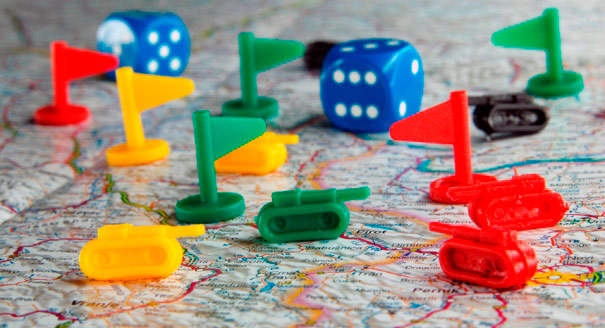Apparently, 2015 is going to be the year of classic geopolitics—so say the wise heads in Brussels, at least. Well God help us if Eurocrats buy that.
After all, the only field where geographic determinism ever actually applies is geopolitical thinking itself: whenever power is too concentrated at the center and the top, you can be sure that leaders will start believing they are masters of the universe. By contrast, the EU’s brand of regionalism always promised the exact reverse—to disperse power downward and to the periphery so that such misuses of power could never happen.
This shake-up is happening because the past master of spatial politics, the United States, is coming unstuck. Twenty years ago, Washington brought the world a whole new geography. Globalization was a brand that presented aspiration (you should all open yourselves up to trade) as fact (you’re all interlinked now anyway). It was the soundtrack to America’s unipolar moment, and it served to amplify U.S. norms approximately forty years after the country’s global hegemony had actually ended.
The United States duly encouraged the EU’s attempts at borderlessness, praising Europeans for their progression from classic garrison states, angry and armed to the teeth, to virtual states, structured as faceless multinational corporations. And the EU patted itself on the head for being sophisticated and postmodern when the United States was merely modern. Once again, Europeans were posing as the urbane Greeks to the clumsy Americans’ Rome.
Well, the financial crisis has rather buried the myth of globalization (when the United States sneezed, only Europe caught cold), and the world is again up for grabs. Yet other regions—from the Economic Community of West African States to the Gulf Cooperation Council, from Mercosur to the Association of Southeast Asian Nations—yawn when Eurocrats dust off their theology of regional integration. After two decades of competitive deterritorialization, it seems the EU can no longer explain its method of managing history and geography.
The EU could usefully revisit its founding narratives.Tweet This
With all this in mind, the EU could usefully revisit its founding narratives. In the red corner, there’s France’s notion of the EU as a Hegelian empire; in the yellow corner, Germany’s idea of the EU as a Kantian federal union; and in the blue, Britain’s concept of the EU as a Burkean bloc. In these three competing grand strategies lies the root of many of the EU’s current problems, but possibly also a way forward.
Here’s a quick recap. Postwar Paris conceived of the EU as a Euromed empire, designed to meet the security problem of the future—the competing Soviet-Slavic and Anglo-American empires, with their focus on global ambition and hard power. In this three-way battle, the Franco-Italian empire would fight for savoir vivre and civilization. And yet France failed to play East and West off in this way without exposing itself to the problem of the past: Germany. Its empire had to incorporate the Germans.
Pacifistic and parochial, Bonn saw the EU very differently—as a federal union forged not by hegemony but by law. The EU would be a local component of a more universal cosmopolitan order, with EU members binding themselves to innate European constitutional principles. The trouble was that only Germany seemed able to discern or embrace these innate principles, meaning that the EU fast began constitutionalizing German hegemony. So Germany needed the institutional genius, Britain.
But London saw the EU differently again, namely as part of a wider, bottom-up reorganization of world politics. Cooperation would be driven not by top-down interventions from Bonn or Paris but by social and market forces unleashed by U.S. economic strength. Britain thus engaged in EU integration only because it occurs within the ambit of a transatlantic Anglosphere that is pragmatic and free market–oriented. The trouble is that the United States sees itself as rather more than guardian of the Anglosphere.
#Germany has predictably turned the EU into a neat ordoliberal dystopia.Tweet This
And so today, seventy years on from the birth of European integration, Germany has predictably turned the EU into a neat ordoliberal dystopia. France is contenting itself with sporadic acts of Euromed heroism in the eurozone or North Africa. And the UK, which mistook the end of the Cold War for the beginning of an era of pragmatism and relativism, has found itself sucked into Washington’s Hegelian “end of history” and a bout of Kantian democracy promotion.
And yet, the EU’s founding principles might just have relevance today. Its members should ask whether the three grand strategies can’t perhaps be rescaled for the multipolar era. The EU could apply a little more bottom-up Burke in its internal affairs, a little more cosmopolitan Kant in its interregional relationships, and have a bit more faith in a Hegelian universal when it comes to global governance.






